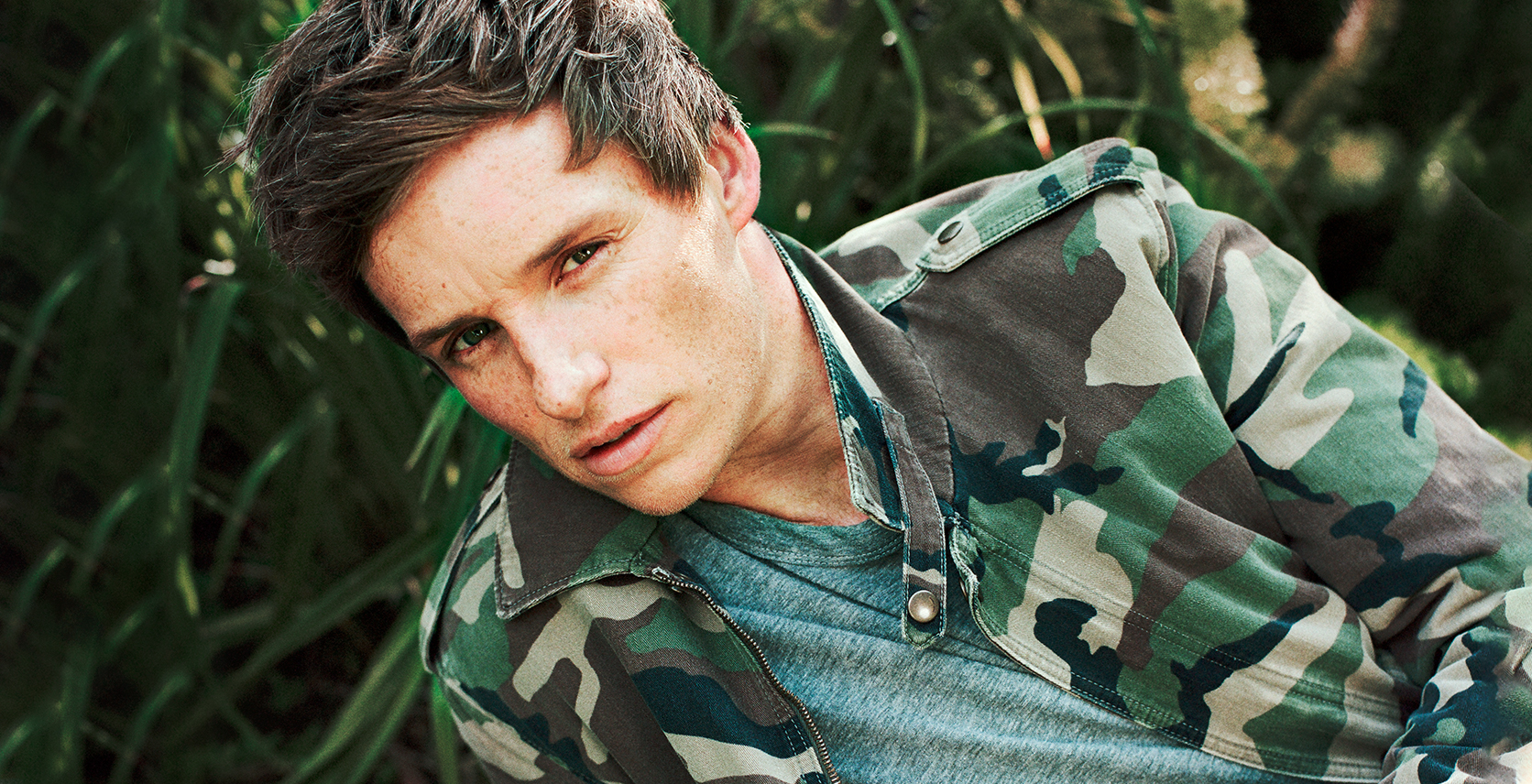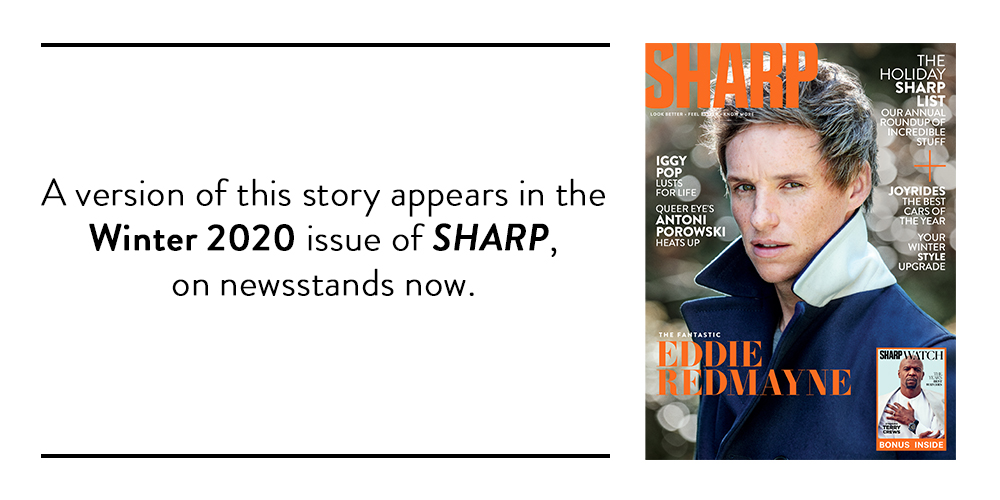The Theory of Eddie Redmayne
“It’s been a long, long time since I wore a pair of jeans,” says Eddie Redmayne. The beloved English actor has spent the last decade or so starring almost exclusively in period dramas and turn-of-the-century fantasy films — the sort of stuff where half the budget is earmarked for the costume department.
In the Harry Potter prequels, Fantastic Beasts and Where to Find Them, he plays a wizard in 1920s New York. In The Danish Girl he’s a transgender woman in 1920s Coppenhagen. He made it to 1956 in My Week With Marilyn — but then, in Les Miserables, he leapt back to 1823. Many actors are typecast. Eddie’s the only one whose type is a year. “He looks as if he lives in 1926,” the producer David Heyman has said, explaining why Redmayne was his first choice for Fantastic Beasts.
Now 37, married to the PR executive Hannah Bagshawe, with whom he has two children, he is poised for a change, and eager to try something new. This fall, Redmayne will appear in The Aeronauts, an adventure film about the pioneering meteorologist James Glaisher, who made important discoveries about the weather from the soaring heights of an enormous gas balloon. It’s set, naturally, in 1862. “I was actively looking for something contemporary, probably American,” he tells me, somewhat apologetically. “I so wanted to get out of tweed.” But then he read the script: a period drama, English, in which he would play a scientist, opposite Felicity Jones, with whom he starred in The Theory of Everything. As a scientist. In England. In the 1950s.
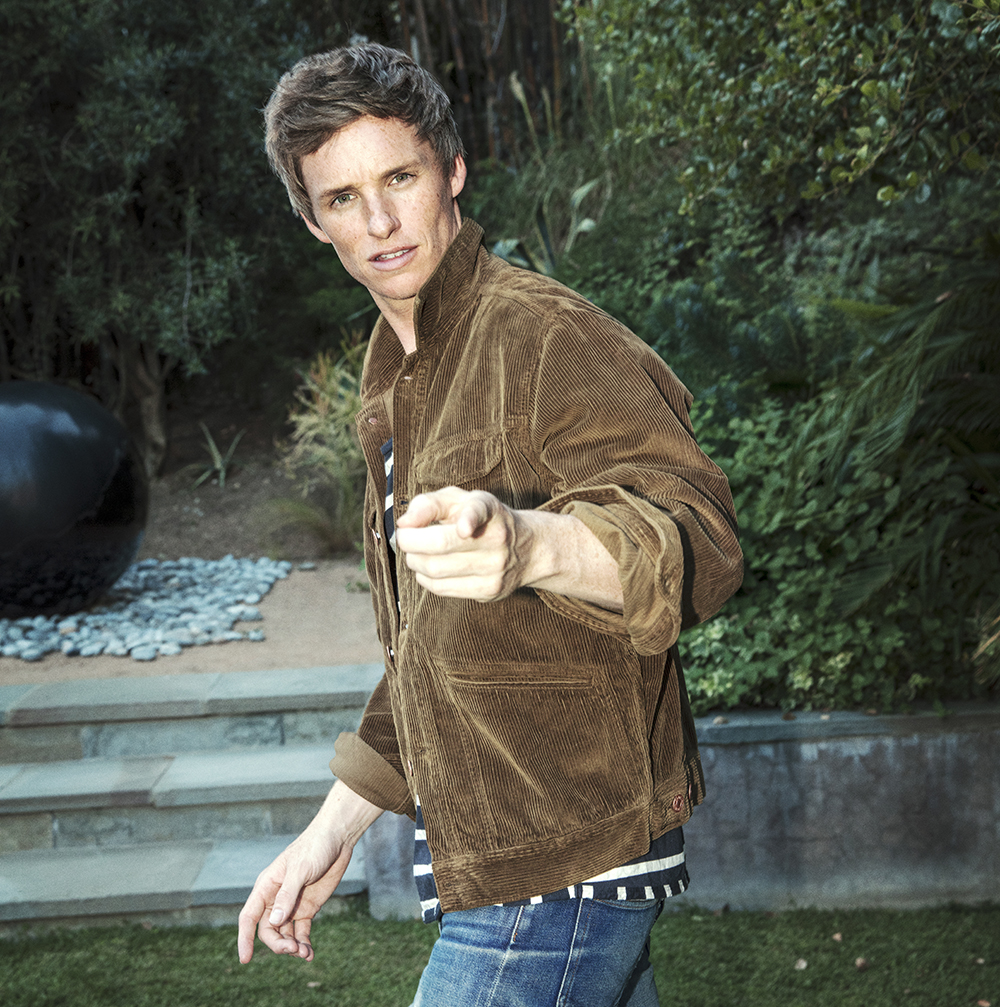
JACKET ($750) BY ISABEL MARANT; T-SHIRT ($480) BY GUCCI; JEANS ($220) BY APC.
“I know,” he sighs. “Yet it was such a thrilling prospect for me. I read the script and I just thought, ‘I would kill to see this in a cinema.’ That’s what did it.”
One of the first things that strikes you, talking to Eddie Redmayne, is his air of absolute modesty. (And not false Hollywood modesty, either.) Fame has had no obvious effect on Redmayne’s character, nor have his many awards. “A lot of hard work went into it, but no more hard work than any other actor is doing in any other film,” he says of his performance in The Theory of Everything. You could almost forget he won an Oscar for that. (The Oscar itself is in his flat in London, on the mantel: “It sits there and looks so shiny and fake that I can’t believe it really exists.”) He is incapable even of speaking about his profession loftily. He’s too self-conscious of how it sounds. “The reason one acts,” he begins, before pausing sharply. “Oh, no, that was the most fucking pretentious way to begin a sentence. Forget it.”
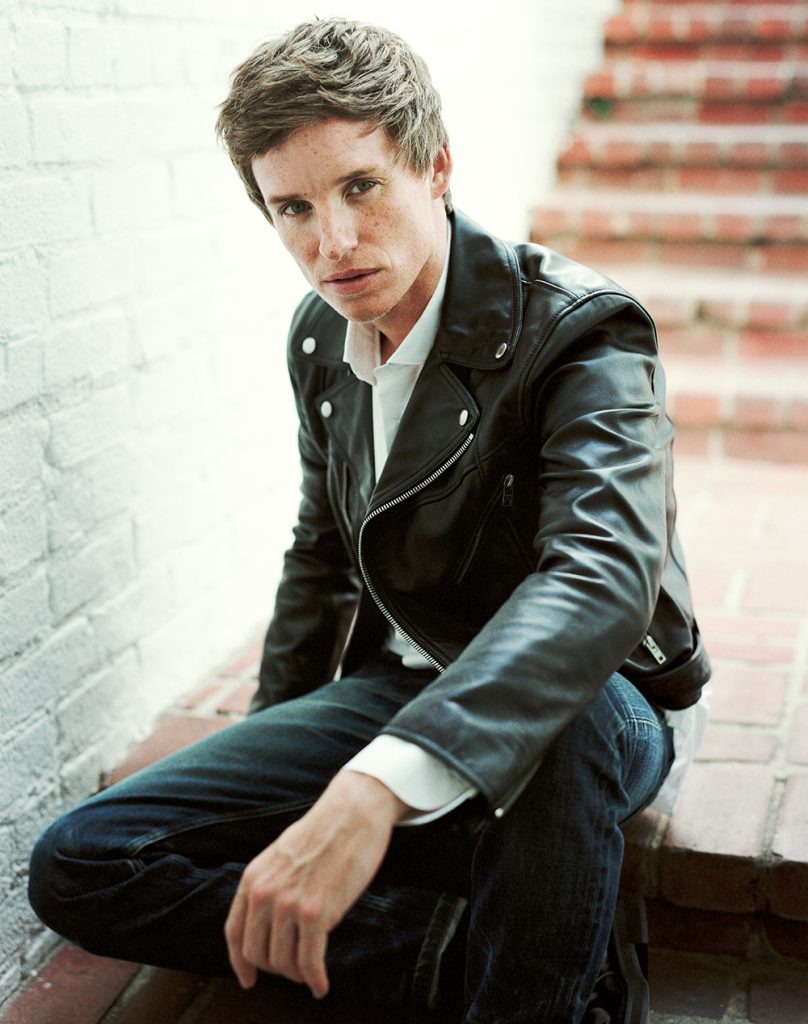
JACKET ($4,950) BY CELINE; SHIRT ($275) BY BIOGLIO; JEANS ($220) BY APC.
Redmayne is rarely satisfied with the work he’s done in a film — even when the work is so plainly excellent. “You’re always frustrated by your own work,” he says. “When you first see a film cut together, all you see are the flaws in your work, and that’s what’s interesting to me. You never get it right. In theatre, you can at least try again the following evening. But on film, there is always that moment when you drive home at the end of the day after filming a scene, and then you have a good idea, and the scene’s already gone. And then you spend the next five months waiting to see that scene and thinking, ‘if only I had done that!’ It’s wonderfully frustrating.” He stops himself, overcome once again. “I’m sorry,” he laughs. “God, I’m making myself sound like such a boring knob.”
“There are things you aspire toward, with the acknowledgement that you’ll never quite get there. But you shape yourself in the process.”
He learned to scrutinize his work early on. Before he became a screen actor, Redmayne worked in the theatre and as a model, regularly going to auditions “in which I would be unceremoniously told no thank you, because I had no idea what I was doing.” His first feature, Like Minds, was a psychological thriller about a young maniac and his therapist, played by Toni Collette. The director had instructed him not to watch any of the footage as it came in, to prevent him from becoming too self-conscious. But after the first day, Toni Collette insisted. “She kept saying, ‘Eddie, come watch playback,’ and I told her I wasn’t allowed.” In the end she forced him. And it pretty much saved his career. “Thank God she did. I’d been playing this character as if I was on the National Theatre stage. It was completely unwatchable.”
Eddie talks fondly, now, of his “learning curve” as an actor. “Each job I do, I watch, I see what I got wrong, and I try to improve for next time,” he says. “I feel like my whole career has been like that.” Strange to say of a man who won an Academy Award in his early 30s — he was the youngest man to win an Oscar since Adrien Brody — and has been enthusiastically acclaimed a dozen times over, but he is a man convinced he can always do better. He thinks of his career the way a professional athlete might: he’s focused on performance, and interested in how to improve.
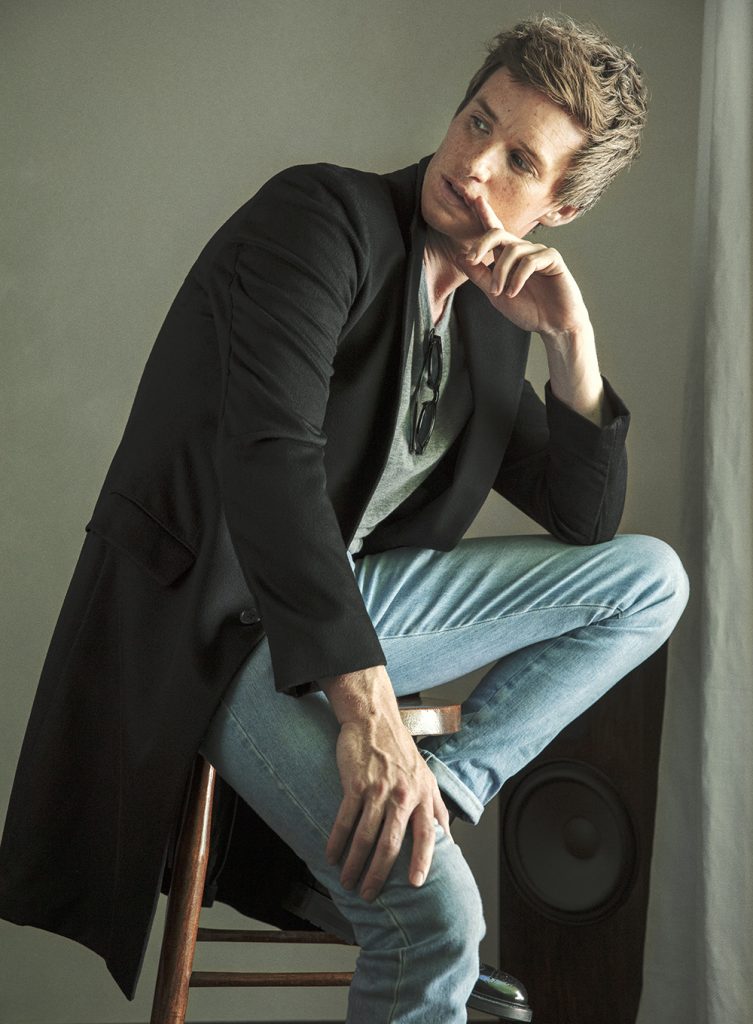
COAT ($4,440) BY PRADA; T-SHIRT ($35) BY BUCK MASON; JEANS (EDDIE’S OWN) BY BRUNELLO CUCINELLI; BOOTS ($1,355) BY SAINT LAURENT; SUNGLASSES ($475) BY OLIVER PEOPLES.
“It’s strange to be immortalized on film,” he reflects. “Because the stuff you’re proud of lives on. And the stuff you’re not so proud of lives on as well.” Audiences will forever be able to watch Redmayne as, for instance, Stephen Hawking in The Theory of Everything. But so too will they be able to watch him as Balem Abrasax, in the much-reviled Jupiter Ascending. “In fact, I know I won a prize for the worst performance of the year,” he says, referring to his Razzie prize for Worst Actor for Jupiter Ascending. But he looks back fondly on the experience: “I really enjoyed it. I went full hardcore serious vibrato Italian tenor, like, gah,” he says. “I gave it my all. Whether it worked or not remains uncertain.” Not that it matters, ultimately. He won the Golden Raspberry on the same night he was nominated for Best Actor at the Academy Awards, for his role as Lili Elbe in The Danish Girl.
It takes courage to admit imperfection. But Redmayne is all about self-improvement. He’s getting better all the time. “I’m not a writer, so I don’t know how good you are at your job. I could read your work, and I suppose I could give my opinion, but I don’t have the skill set to know. But the thing about acting is that you’re playing a human being. Everyone has the right to judge whether you appear real or not. And everyone does.” The criticism that emerges, near-constant and surely overwhelming, is Eddie’s lifeline, his key asset. “There are things you always aspire toward, with the acknowledgement that you’ll never quite get there,” he says. “But you’re just trying to learn and shape yourself in the process.”
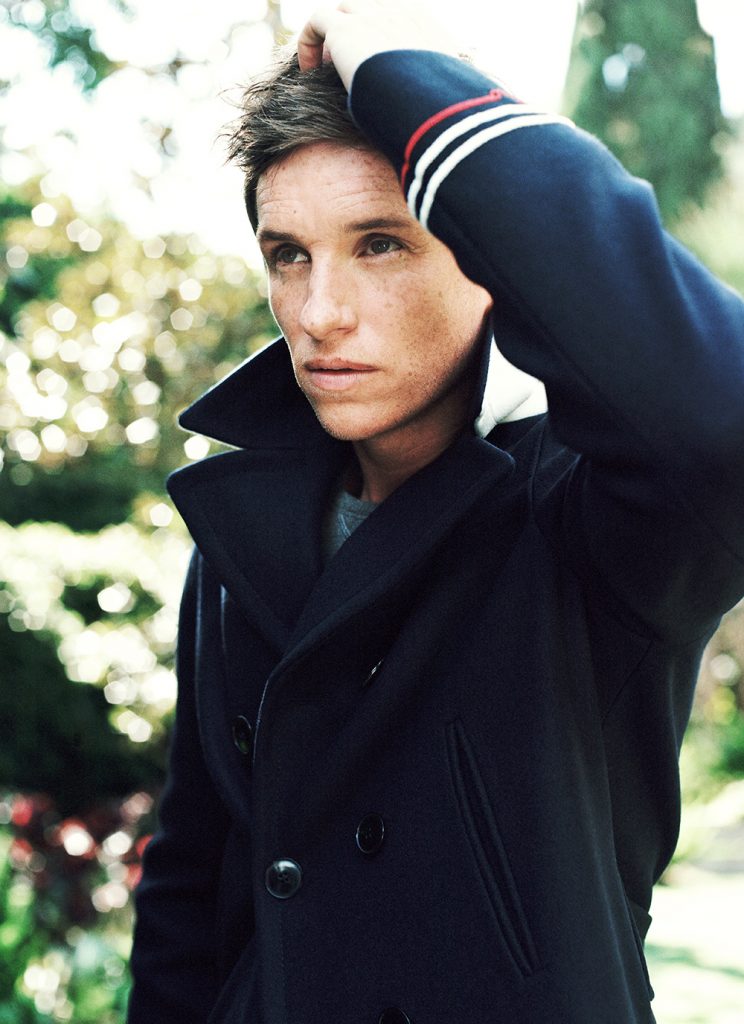
JACKET ($2,550) BY VALENTINO; SWEATSHIRT ($390) BY THE ROW.
While The Aeronauts will find him on familiar ground, Eddie is keen to be challenged, to explore more exotic territory. Trying something unusual has in the past been his most rewarding strategy. “I have never had specific aspirations,” he says. “In fact, the roles that have been most successful for me have been parts that someone told me I should play when I didn’t really see it. People often ask me if there’s a part I want to play someday, but it’s never worked like that. I enjoy jumping off a cliff.” Going forward, that will mean fewer costume dramas set in Victorian England. It will mean, eventually, wearing jeans. “That’s where my head’s at, at the moment.”
Eddie is set to begin production on a new project shortly — a heavy civil rights drama called The Trial of the Chicago 7, written and directed by West Wing and Newsroom showrunner Aaron Sorkin. “And that one is actually set in the 1960s,” he points out, encouraged. “So at least I’m edging forward toward the 21st century.” Sorkin, however, does feel like a change — the right sort of move for Redmayne, at this stage in his career. You can picture it already: Eddie gliding briskly around a courtroom in a plaid shirt with a flared collar, cooly discharging some snappy Sorkin one-liner. He is looking forward to the break with the norm. And to the costume change. “If nothing else,” he says, “it will be good for me to get out of tweed.”
